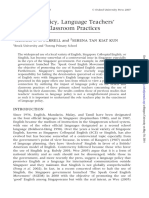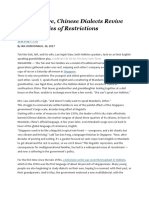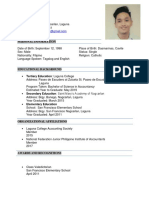Should We Stop Speaking Singlish Lah
Uploaded by
zuominShould We Stop Speaking Singlish Lah
Uploaded by
zuominShould we Stop Speaking Singlish Lah?
Social Documentary Proposal 2012
What is your research question? Our research question is Should we Stop Speaking Singlish Lah?. We chose this interesting and unique topic because in Singapore, a multi-ethnic society, there is a language that is commonly used by all walks of life. This language is spoken by almost all races Chinese, Malays, Indians, and even some Europeans. Moreover, it is spoken by Singaporeans regardless of his socio-economic status. In fact, it is not uncommon to see a hawker, a taxi driver, or even a CEO speak Singlish to his friends and family. This language is called Singlish, Singapores very own hybrid language. We aim to investigate if Singlish should be spoken in day-to-day life. Background of Social Issue history, current status and why it is controversial 1. History of how Singlish developed Singlish is a hybrid language of English, Malay, Chinese dialects (Hokkien, Teochew and Cantonese) and Indian dialects (Tamil, Bengali and Punjabi) widely spoken by local Singaporeans.
2. Why Singlish is commonly spoken amongst Singaporeans (effectiveness, quick) With the rising emphasis on pragmatism and efficiency in Singapore in 1980s, Singlish started to abandon the Standard English grammatical rules and adopt a simpler rule to allow faster communication (Choo, 2011). Singlish has become a topic-prominent language often begin with a topic (or a known reference of the conversation), followed by a comment (or new information) compared to the unimportance of the semantic relationship between topic and comment in English. Moreover, some of the linguistic devices such as pronouns and articles are omitted. 3. Governments stance on Singlish and why it should not be spoken (believes that Singaporeans only have a superficial knowledge of Standard English and are unable to speak Standard English in full) Yet, Singlish is rendered by the government as a barrier for Singapore to play a big bigger role in global economy. Singlish that Singaporeans use can be only understood by other fellow Singaporeans. This will be counterproductive in todays globalized marketplace. Hence, in 2000, then Prime Minister Goh
Chok Tong launched the Speak Good English Movement (SGEM), which aims to ensure that Singaporeans recognize the importance of speaking Standard English and also to encourage them to use it (Toh & Cai, 2010). However, many Singaporeans hold an alternative point of view. In 2002, TalkingCock, a Singaporean satirical website, launched the Save Our Singlish Campaign to counteract the SGEM. They declare that they completely support the writing and speaking of good English but they believe Why were fighting for Singlish, is because its simply a part of our culture. In fact, it may be the ONLY thing that makes us uniquely Singaporean. It mixes all the various languages, which to me, seems to spread multi-cultural understanding. I thought this was something to be proud of. They argue that speaking good English should not be promoted at the expense of Singlish. In addition, the Speak Good Singlish Movement on Facebook in response to SGEM 2010 is another case in point.
Why is this issue important? 1. National identity Language, as a symbol of culture, is also a sign of identity. When in a countries where people of different races are living together, hybrid languages is crucial in national identity building. - Hybrid Language is unique to each nation state - Able to unite various races - Sense of familiarity and homeliness - Proud of Singlish, only Singaporeans can understand and use effectively
2. Multicultural Integration Hybrid languages allow citizens to have a better understanding and perspective of other cultures and thus help to integrate people from different cultures. For instance, in Singapore, where a hybrid language of Singlish is widely used by her citizens, Chinese understand some words of Malay and Indians also understand what is Kuay Teow (a traditional Chinese cuisine from Teochew) and Siew Mai (a delicious Cantonese Dim Sum). Improves Communication between one another During the process of interacting with one another, different races are bonded together and live together harmoniously in an integrated society. This kind of integration is common in other area where hybrid languages are widely used and accepted by the residents.
3. Government Strong Stance against Singlish Against: The Speak Good English movement should help create the right conditions so that the degree of immersion is increased. Suggest and encourage a high value to learning and using good English. Start with the leaders of society and the iconic figures. The rest will slowly fall into place. Singlish is rendered by the government as a barrier for Singapore to play a big bigger role in global economy.
For: They declare that they completely support the writing and speaking of good English but they believe Why were fighting for Singlish, is because its simply a part of our culture. In fact, it may be the ONLY thing that makes us uniquely Singaporean. It mixes all the various languages, which to me, seems to spread multi-cultural understanding. I thought this was something to be proud of.
Who should it concern? 1. Singaporean citizens from different ethnicities (builds national identity and sense of belonging) 2. Government 3. Schools 4. Teachers, Students
What are some possible perspectives to it? 1. Government 2. Schools 3. Singaporeans 4. Foreigners?
What are some suggestions/resolutions to the issue? - Unnecessary and a waste to get rid of Singlish completely (culturally important) - Still important to learn Standard English - Speak Good English only when necessary (business negotiations, work, speaking to foreigners etc)
- Speak Singlish during informal conversation to friends, hawkers, colleagues - 'Speak Good English' (when necessary)
You might also like
- Using Linguistically Appropriate Practice: A Guide for Teaching in Multilingual ClassroomsFrom EverandUsing Linguistically Appropriate Practice: A Guide for Teaching in Multilingual ClassroomsNo ratings yet
- Spe578 v5 wk5 Classroom Management Worksheet 167% (3)Spe578 v5 wk5 Classroom Management Worksheet 13 pages
- (Ebook) English in Singapore: Modernity and Management (Asian Englishes Today) by Lisa Lim (editor), Anne Pakir (editor), Lionel Wee (editor) ISBN 9789888028429, 9888028421 instant download100% (3)(Ebook) English in Singapore: Modernity and Management (Asian Englishes Today) by Lisa Lim (editor), Anne Pakir (editor), Lionel Wee (editor) ISBN 9789888028429, 9888028421 instant download55 pages
- Complete Download (Ebook) English in Singapore: Modernity and Management (Asian Englishes Today) by Lisa Lim (editor), Anne Pakir (editor), Lionel Wee (editor) ISBN 9789888028429, 9888028421 PDF All Chapters100% (3)Complete Download (Ebook) English in Singapore: Modernity and Management (Asian Englishes Today) by Lisa Lim (editor), Anne Pakir (editor), Lionel Wee (editor) ISBN 9789888028429, 9888028421 PDF All Chapters81 pages
- Singlish and Social Inequality Research ProposalNo ratings yetSinglish and Social Inequality Research Proposal4 pages
- English in Singapore Modernity and Management Asian Englishes Today Lisa Lim (Editor) pdf download100% (1)English in Singapore Modernity and Management Asian Englishes Today Lisa Lim (Editor) pdf download79 pages
- Singapore English Cover-Op2.pdf 2010/9/2 11:20:47 PM100% (1)Singapore English Cover-Op2.pdf 2010/9/2 11:20:47 PM323 pages
- Overseas Singaporean Attitudes Towards SinglishNo ratings yetOverseas Singaporean Attitudes Towards Singlish17 pages
- 5L18 Singlish - Broken English or Badge of IdentityNo ratings yet5L18 Singlish - Broken English or Badge of Identity5 pages
- The Sociolinguistic Situation in SingaporeNo ratings yetThe Sociolinguistic Situation in Singapore12 pages
- Learn Indonesian language Phrase Book: Common practical phrases and grammar guide to speak good Bahasa Indonesia easily and effectivelyFrom EverandLearn Indonesian language Phrase Book: Common practical phrases and grammar guide to speak good Bahasa Indonesia easily and effectivelyNo ratings yet
- Singlish in The School An Impediment or A ResourceNo ratings yetSinglish in The School An Impediment or A Resource17 pages
- English in Singapore Modernity and Management Asian Englishes Today Lisa Lim (Editor) 2024 scribd download100% (2)English in Singapore Modernity and Management Asian Englishes Today Lisa Lim (Editor) 2024 scribd download81 pages
- Whos Being Elitist A Debate About The Enregisterment of SinglishNo ratings yetWhos Being Elitist A Debate About The Enregisterment of Singlish23 pages
- THE REPUBLIC OF SINGAPORE (WRITTEN REPORT)No ratings yetTHE REPUBLIC OF SINGAPORE (WRITTEN REPORT)4 pages
- ENG 415 Term Paper - Sadia Afrin - Maymuna Aktar MimNo ratings yetENG 415 Term Paper - Sadia Afrin - Maymuna Aktar Mim14 pages
- Reading 1_Singapores language policy and its globalised concept of Bi-trilingualismNo ratings yetReading 1_Singapores language policy and its globalised concept of Bi-trilingualism18 pages
- English Language Teaching: a Political Factor in Puerto Rico?From EverandEnglish Language Teaching: a Political Factor in Puerto Rico?No ratings yet
- Multilingualism and Language Policy in SingaporeNo ratings yetMultilingualism and Language Policy in Singapore24 pages
- English in Singapore Modernity and Management Asian Englishes Today Lisa Lim (Editor) - The complete ebook set is ready for download today100% (1)English in Singapore Modernity and Management Asian Englishes Today Lisa Lim (Editor) - The complete ebook set is ready for download today55 pages
- j.1467-9 Crossing' in Singapore71X.2011.01700.xNo ratings yetj.1467-9 Crossing' in Singapore71X.2011.01700.x15 pages
- Bilingualism and Malay Language Planning in SingaporeFrom EverandBilingualism and Malay Language Planning in SingaporeNo ratings yet
- English in Post-Revolutionary Iran: From Indigenization to InternationalizationFrom EverandEnglish in Post-Revolutionary Iran: From Indigenization to InternationalizationNo ratings yet
- Bao 2011 Convergence-To-Substratum and The Passives in Singapore English (Creoles, Their Substrates, and Language Typology)No ratings yetBao 2011 Convergence-To-Substratum and The Passives in Singapore English (Creoles, Their Substrates, and Language Typology)18 pages
- Exchange to Engage: The guide to engaging diverse communities through language exchangeFrom EverandExchange to Engage: The guide to engaging diverse communities through language exchangeNo ratings yet
- Language Policies - Impact On Language Maintenance and TeachingNo ratings yetLanguage Policies - Impact On Language Maintenance and Teaching11 pages
- The Essentials: Dual Language Learners in Diverse Environments in Preschool and KindergartenFrom EverandThe Essentials: Dual Language Learners in Diverse Environments in Preschool and KindergartenNo ratings yet
- English in Singapore: History and Current Debates100% (4)English in Singapore: History and Current Debates18 pages
- Compelling Conversations - Japan: Questions and Quotations for High-Intermediate Japanese English Language LearnersFrom EverandCompelling Conversations - Japan: Questions and Quotations for High-Intermediate Japanese English Language Learners3/5 (2)
- Cultural Heritage and Its Role in GlobalizationNo ratings yetCultural Heritage and Its Role in Globalization2 pages
- Old Religion, Festivals and Holidays in The PhilippinesNo ratings yetOld Religion, Festivals and Holidays in The Philippines52 pages
- The Important of Song and Poetry in TeachingNo ratings yetThe Important of Song and Poetry in Teaching18 pages
- Dalit Christians and Identity Politics in IndiaNo ratings yetDalit Christians and Identity Politics in India9 pages
- Frampton - Rappel A L'ordre The Case For The TectonicNo ratings yetFrampton - Rappel A L'ordre The Case For The Tectonic13 pages
- India by Design: Colonial History and Cultural Display, by Saloni MathurNo ratings yetIndia by Design: Colonial History and Cultural Display, by Saloni Mathur5 pages
- Materi Sosialisasi Enrichment Program ComDev TrackNo ratings yetMateri Sosialisasi Enrichment Program ComDev Track52 pages
- Table1: Frequency and Percentage Distribution of Undergraduate As Per Their Personal Profile 400 Socio-Demographic Variables F (%) Age (In Years)No ratings yetTable1: Frequency and Percentage Distribution of Undergraduate As Per Their Personal Profile 400 Socio-Demographic Variables F (%) Age (In Years)5 pages

























































































